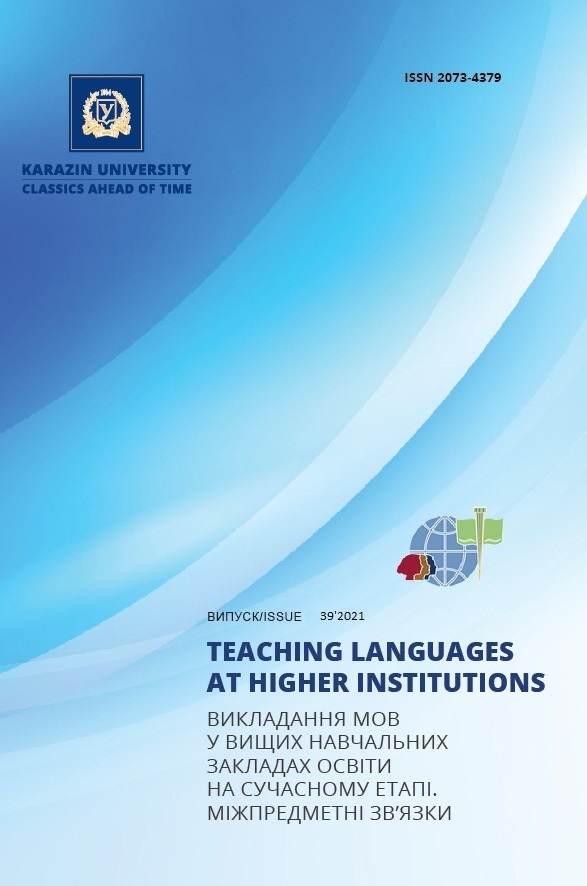The use of song material in lessons of Ukrainian as a foreign language
Abstract
The authors investigate some specifics of using song material in the formation of foreign language communicative competence when teaching Ukrainian to students of different levels of language proficiency.
The relevance of the article is determined by the fact that there is an insufficient number of educational resources on the Ukrainian language for foreign students and also by the proven effectiveness of the studied type of educational material, and consequently by the necessity of developing a method for its optimal use.
The aim is to develop a methodology of using song material in lessons of Ukrainian as a foreign language for students of different levels with a focus on popular contemporary songs.
Methods of research used in the article comprise critical analysis of literary sources; study and generalization of teachers’ work; trial teaching.
Main results. The article offers methodical recommendations for using song material in lessons of Ukrainian as a foreign language to fulfill such educational tasks: use of song material as phonetic exercises and for correction of pronunciation, use of song material as a motivator for studying the creativity of writers and poets, use of song material in studying the lexical and grammatical material. The authors propose a technique for a complete lesson for studying a chosen song, and also variants of using the song “Dumka” based on the poem by Taras Shevchenko at different stages of language learning. Emphasis is placed on modern songs, in which music is set to verses of prominent classics, and examples of songs that are recommended for use at different stages of the educational process are given.
Conclusions. Usage of song material has some important advantages in the practice of teaching Ukrainian to foreigners and allows creating the most authentic environment in the classroom; removing psychological barriers; improving a classroom microclimate; increasing opportunities for foreign students to get acquainted with Ukrainian traditions and culture in a timely and versatile manner; adaptation of students to the language uses, providing them with song material to get involved in authentic Ukrainian language.
Downloads
References
“Dumka” (na slova Tarasa Shevchenka) u vykonanni gurtu “Fata Morgana” [“A Thought” (lyrics by Taras Shevchenko) performed by “Fata Morgana” band]. Available at: https://www.youtube.com/watch?v=jmynZjUa4Ts [Accessed 28 Aug. 2021] [in Ukrainian].
Polenok, Z.V. (2009).Vykorystannya pisennogo tekstovogo materialu na urokax anglijskoyi movy. [Using a song textual material in English classes]. Inozemni movy [Foreign Languages], Kyiv National Linguistic University. Kyiv: “Lenvit”, 2, pp. 9–11 [in Ukrainian].
Posvystak, Yu.S. (2010). Vykorystannya kazok, virshiv, pisen ta prykazok dlya intensyfikaciyi vyvchennya leksychnogo ta gramatychnogo materialu na urokax anglijskoyi movy.[Using fairy tales, songs and sayings to intensify acquisition of vocabulary and grammar material in English classes]. Kyiv: Centr uchbovoyi literatury, pp. 46 [in Ukrainian].
Stankevych, N.I. (2016). Vzayemopovyazane navchannya vydiv movlennyevoyi diyalnosti v kursi ukrayinskoyi movy yak inozemnoyi: teoretychnyj i praktychnyj aspekty. [Integrated teaching of types of language activity in a course of Ukrainian as a foreign language]. Teoriya i praktyka vykladannya ukrayinskoyi movy yak inozemnoyi: zb. nauk. pracz. [Theory and practice of teaching Ukrainian as a foreign language: Collected scientific works]. 12. Lviv, pp. 232–242 [in Ukrainian].
Bastidas, J.A. (2002). How to Use Songs in the EFL/ESL class. MEXTESOL Journal, 3. Mexico : Mextesol Association, pp. 65-78 [in English].
Gruhn, W. (2013). Kinder brauchen Musik: Musikalit ät bei kleinen Kindern entfalten und fördern. Weinheim: Beltz [in German].
Kast, B., Bimmel, P. and Neuner, G. (2017). Deutschunterricht planen Neu. Ernst Klett Sprachen, p. 28 [in German].
Kress, G., van Leeuwen, Theo. (2001). Multimodal Discourse: The Modes and Media of Contemporary Communication. London: Arnold [in English].

